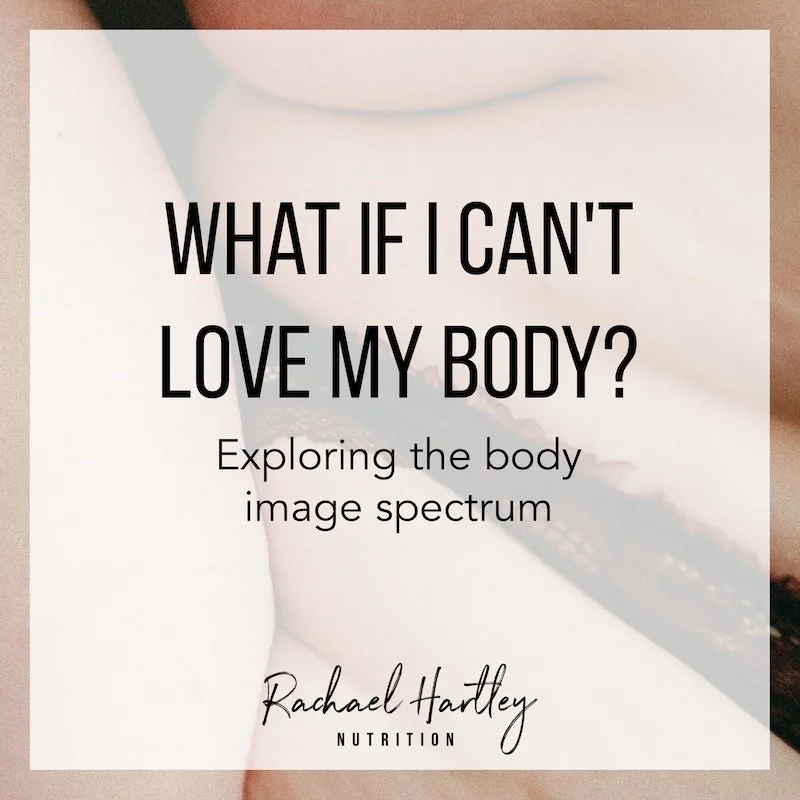Exploring the Body Image Spectrum — Registered Dietitian Columbia SC


The body image spectrum goes beyond viewing body image as positive or negative. It acknowledges the continuum of body image and it’s dynamic nature. It also incorporates other aspects of body image outside of perceptual body image (how one sees their body), including how one thinks, feels, or behaves towards their body.
Let’s dive in a little further and explore the body image spectrum…
Body Hate
Body hate is unfortunately a feeling many people experience towards their body. These intense feelings often occur when someone feels like their body isn’t doing what it’s supposed to do, whether that’s complying with societal pressures to fit into a certain mold, navigating the physical environment (which may not be physically accessible for all bodies), or somatically reacting in a way that’s uncomfortable, for example, with a trauma response. Essentially, body hate arises when one blames their body for feeling something that is physically or emotionally distressing. You might find it helpful to break this down further into body hate and body dislike, which is less intense.
Body Tolerance
Body tolerance is not about liking your body or feeling positive towards it, but simply being able to sit with intense physical or emotional feelings and tolerate them. I often describe body image work as the recognition that you and your body have been put together for the longest ever group project called life. Body tolerance is when you don’t necessarily like the partner you’ve been paired with, but recognize you’ve got to figure out a way to work together, and that starts with tolerance.
Body Respect
Body respect has little to do with how you feel about your body, and is all about how you treat your body. This aspect of body image focuses on the behavioral piece. It doesn’t require liking your body, simply treating it with respect by taking care of it’s basic needs, like nourishing it with adequate food, engaging in basic self care, and avoiding body harming behaviors (like overexercise, sleep deprivation, etc.). This is the baseline of what’s required for intuitive eating and recovery – an important reminder for anyone who feels like it is only for people who love their body.
Body Acceptance
This is another aspect of body image that most people assume requires more positive feelings towards your body than it actually does. To me, body acceptance is viewing your body with an “it is what it is” attitude. I often think of Acceptance and Commitment Therapy (ACT), which involves accepting feelings without trying to change them, and learning to engage in values-aligned behaviors despite shifts in how you might be feeling. Body acceptance and body respect are deeply intertwined.
Body Appreciation
In scientific literature, body appreciation is measured with a 13-point scale that looks at everything from body acceptance, satisfaction, self worth and self care. Personally, I look at body appreciation in a much simpler way. Body appreciation is simply having some degree of appreciation for what your body does for you, no matter how fleeting. It could be anything from appreciating your body for quickly fighting off the same cold that took your partner out of commission for a week, appreciating your legs for allowing you to enjoy a beautiful hike, or appreciation for something as simple as one of your organs working effectively!
Body Neutrality
Body neutrality has become a bit of a buzzword, and I’ve had many clients come to work with me over the years with body neutrality as their stated goal rather than body positivity. Body neutrality is (for lack of a better word) having neutral feelings towards your body – not positive, not negative. It’s a more objective, less emotional viewpoint of ones body, which can often free up a lot of headspace and allow you to build self worth outside of how you feel about your body. When you are experiencing body neutrality, you’re probably not thinking about your body very much.
Body Trust
Body trust isn’t necessarily about a feeling towards or about your body, but rather a sense that arises in the context of a strong relational dynamic or connection with your body. With body trust, there is a collaborative relationship between your brain and body, where you’re doing your best to respond to body cues from a place of caring and respect. You might not always understand your body’s signals, but there is trust that it’s doing what its doing for a good reason that needs tending to. I talk about body trust a lot with my clients around hunger cues. When someone has spent a long time suppressing and ignoring hunger cues, they often find that hunger cues are absent or spring up in confusing ways. But just like building trust in a relationship, when they show up over time an honor those cues with adequate nourishment, hunger and fullness cues start to show up more consistently.
